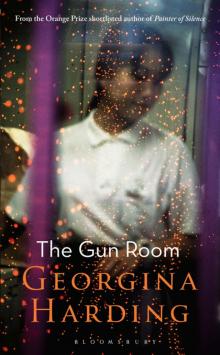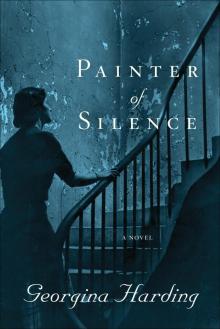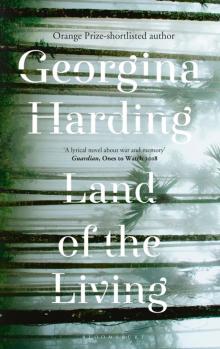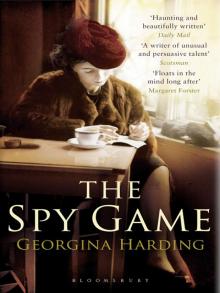- Home
- Georgina Harding
Harvest Page 2
Harvest Read online
Page 2
She’s put you in the spare room, I hope you don’t mind. (She did mind. She minded very much. She minded the distance that was put between them, from that beginning.) Mum’s a bit old-fashioned about things like that, a bit out of touch. But she’s looking forward to meeting you. Let her take you around the garden, she’ll like that.
He wanted to please her. He wanted her to please his mother. She understood that. He wanted the two women, his mother and his girl, to meet and talk in the garden, two women walking, and he would see them from the window inside, these pieces of his life running one alongside the other.
It had been easy to see that she was Jonathan’s mother. She was small and slim and dark like him, quite dark she thought for an English person, a pretty woman still. Her face was lined, from being out in all the weather, she thought, in the garden and the countryside, lines about the eyes and grey in her hair, but she moved briskly as if she was younger; precision in her movements, a little sharp and tight.
They walked out from the house across the lawn. Jonathan stood at the window. No need to come with us, Claire had said in her crisp clear way, and he had said no, fine, he’d seen the garden so many times; though he didn’t turn away, he didn’t seem to be wanting to do anything else.
There were double doors that opened into the heart of the garden, onto flagstones, a little area where there was a table and chairs, and then onto the lawn and the flower beds and the hedges. It was late in the day so there were long shadows. There was this one moment in the year, Claire said, stopping and turning to look at her, when the garden was its best. And Kumiko said then she was lucky to be there.
Claire smiled, out there in the evening sunshine, a neat little English smile that went quickly away, that was like the smile of an Englishwoman in some old movie. (But also like Jonathan’s smile, so many of her gestures like Jonathan’s.) It was perfect now, Claire said. Kumiko saw that her hands could not resist breaking off a dead rose head as she spoke. She did not even seem to notice that she was doing it.
The girl spoke English well, but with slight pauses where she looked about or her hands moved as she sought a word. What she said was expressed very simply. Claire couldn’t tell if this was because this was specific to her or because she was speaking English, or because this was the way that all Japanese girls spoke.
Charles de Mills, this rose is called. It’s one of my favourites.
It’s beautiful. An English rose.
This one isn’t English, actually, this rose is from France. Many of my roses are French. People don’t think that. People think this garden is classically English, but it isn’t really, not the plants at least. Or perhaps it is, she might have gone on, it was, classically English, just because of that, because the plants came from everywhere, because the mild English climate was so tolerant of plants from other parts of the world whose climates were more extreme, even here in Norfolk, in the east, where it could be so much colder in the winter than in the west, and because the English were tolerant of the way they grew, unlike the French who might have grown all of the same plants but made their gardens so much more formal. But she didn’t say any of that. She let her words fade. Perhaps it is, she just said, classically English, looking at the tangle of plants, and left it there. The girl was tired after her flight. One could see that. Tact then, not rudeness, to walk on a little in silence.
She looked like a pretty little doll, Claire had thought when Jonny came home and showed them his photos. Or was that just a mother’s resistance to her boy’s foreign girl? And this girl wasn’t just foreign. She was Japanese. Her son had been away three years, and had spent much of that time in Japan, writing her occasional rare letters from there that said that the cities were vast but the gardens were lovely, and when he came back he had shown them his photos; and now this girl had come to visit them, suggesting that she was important to him, that she wasn’t just some girl to be known and loved and photographed abroad and then left behind, this Japanese girl with a bright face, who was yet so obviously tired after her long flight. And here she was, speaking to this girl, making conversation, letting conversation pause, noting how the greenfly gathered on a rose shoot, and how composed the girl seemed, despite her evident tiredness. She didn’t really know anything about the Japanese, she thought; only what Jonny had said, in his letters and since he had come home. She had been used to thinking of them mainly as the people whom her husband had fought in the war, hating them even, for that – though Charlie had said so little; what knowledge she had was drawn mainly from what others said, others who had been in Burma or been prisoners, or more often others who had known other people who had been there, as no one who had actually been there seemed to say very much. Slowly over the years, over the time that Jonny was away, she had come to revise her understanding, to see that his Japanese were different from theirs, to accept that the one thing didn’t necessarily connect with the other, the history and how things were now. Even so, that didn’t quite dispel the distrust. Though she had to admit, really it did look as if the two of them had had a happy time, Jonny and his girl out there in Japan, this pretty girl always smiling her wide open smile, on the beach or in the park or in the mountains or wherever it was they went.
Now that they had met she saw that the girl was neither quite so pretty nor so doll-like as in the photos. Her nose was perhaps too small, mouth too wide, for prettiness, features somehow too irregular for a doll. Women like Claire had been brought up to regard themselves and their kind critically. To think, if her legs weren’t her best feature then should she wear her skirt so short? But the brightness of her expression made up for much of that. She managed some brightness even as she shook away a little yawn that showed how tired she was. She put up a hand to stifle the yawn, shook off her tiredness and looked about her some more. How long have you lived here? she was asking. Did you make all this garden yourself? Since I was married, Claire said, and yes, she had made the garden, over the years; it was amazing to think that almost everything that was in it now she had planted herself, so little remained from before, things that she had planted become trees, views cut off, others created, the place quite transformed. Even Charlie would scarcely have known it now. Do you have a garden in Japan? she asked, and the girl said no, she had always lived in an apartment, though her grandparents had a garden, her grandparents had an old house in its own garden, not so big as this one, in fact very much smaller, but a very nice garden all the same. Again the girl yawned. Let’s go in, Claire said, have supper. We’ll start without Richard if we have to. You must be so tired after your flight.
She was awake a long time the first night. This was not surprising, after the flight. She had never flown long-distance before. She felt the night grey in her head, not black, never quite black. The night was grey and the room where she did not sleep was spare and the house where so many people had passed in the past sounded of emptiness even though Jonathan’s mother and his brother were asleep in the rooms along the passage, and Jonathan himself asleep where he had slept through his childhood – and the dog downstairs, which was a new dog, Jonathan had said, that his mother had got while he was away, not the kind of dog they used to have, big golden dogs, retrievers, but a spaniel, black-and-white and long-eared, which slept in a basket in a corner of the kitchen. She had an idea that the emptiness she heard was not only inside her jet-lagged head but also the wind in the hollow of the chimney above the fireplace in the room. And that was black. In the winter, she thought, in the past when those others had lived in the house, there would have been a fire burning, smoke filling the chimney in the nights, and inside it would be black from that, soft and black from soot; but now in the summer the chimney was empty. The wind brought the sound of the clock from the church across the fields. The sound came through the open window and down the black chimney also. She put on the light and saw that the time on her watch was still the time in Japan. One a.m. in England, by the clock. Nine in Japan. She corrected her watch and lay awake some more.
She thought about the day. She thought about the past that was all around her in the house, and was connected to Jonathan but not connected to her; the past of people she had never known. They had gone for a walk that afternoon, she and Jonathan and Claire. They had lunch, and then they took her around and showed her the village and the church, tall and white in the sunshine that came through its long windows, and close to the church, the Hall, at the end of a long drive. Claire said that the family used to live in the Hall. And then in the 1930s Jonathan’s uncle had sold the Hall and come to the farm, and brought with him to the farm all the stuff that they had in the house – not everything from the Hall of course, she said, because the farmhouse was so much smaller, but whatever was best and most valuable or meant something to the family. I imagine the rest got lost along the way, she said. Sold or burnt, she said, disposed of; you know how these things happen. But how was a girl like Kumiko supposed to know a thing like that? She pictured a bonfire in the fields, of furniture, of whatever it was that a family did not value, old brown cupboards and chairs, and broken picture frames and books and bookcases and dishes, lost between the Hall at the edge of the village and the farmhouse in the countryside, flames and an upturned table, and the hedgerows and the church behind.
She didn’t hear him coming, only the door when it opened. He knew how to walk those old floors without making a sound.
Did you always walk around this house at night, she whispered, without anyone knowing?
Was that what he had done as a boy, creeping down the passage, down the stairs? So that his mother didn’t hear, his brother didn’t hear.
The stairs have carpet on them now, he whispered back. It’s much quieter since the carpet was put down.
They were like naughty children, excited to be doing secret things in the dark. Giggling as they tried to be silent, biting fingers, hands over each other’s mouths. It was so long since they had made love.
Are you happy to be here?
Now I am.
And she was at that moment, everything about her foreign and new, even though it was so old, except for the feel of his skin and the smell of him against her.
He was gone before she woke up. (Why could he not have stayed until she woke, she thought, so that she might wake beside him?) It was six a.m. and light like day. The church clock sounded, a minute ahead of her watch. In Japan it was afternoon already. She went to the window and pulled back the curtains. There were no other houses to see. There was no one to hear, not inside the house or outside of it. There were birds singing. She felt she was the only person anywhere. She was a city girl. She had never had that feeling before, that she was the only person in the world, getting up out of bed and drawing the curtains onto a bright day where no one was. She stood at the window looking down at Claire’s garden. There was the lawn, and there were all the flowers, and behind the flowers a hedge like a wall, so dark that it was almost black at that time of the morning with the sun low behind it. The hedge was high so that if someone was walking on the other side he wouldn’t be visible from the house, it would be way above his head. And he would see nothing of the garden or of the people in it. He would have to stand a little bit back even to see the upstairs windows of the house. She saw Richard there, out in the field. She didn’t know if he saw her looking down, her face behind the glass.
Beyond the hedge was Richard’s farm. The fields were all one shade of green, stretching out a long way. It was a duller, bluer green than the grass in the garden. Jonathan said that if she stayed long enough she would see them turn to gold.
The lovely garden of Joséphine de Beauharnais
I want lots of flowers, she said to Charlie. Colour. I want masses of colour.
The garden lay white under snow. It was 1947, a cold winter that seemed to be meant to cauterise the recent past. When Claire looked out there was no distinguishing any more between the surface of the garden and that of the fields beyond, smooth and white to the grey horizon. Even the line of the fence was erased where a drift had swept against it. She had woken before him. Gone out into the snow. Now he had come out to join her.
Roses, lupins, irises, dahlias. Delphiniums, I love delphiniums. Peonies, big deep red ones. What else? Rhododendrons and azaleas. Can one grow rhododendrons here?
But you don’t know anything about gardening.
It was true. Those were about all the flowers she knew, apart from ordinary little flowers like daisies and forget-me-nots, which never found their way into London florists’.
I’ll learn. I can begin to learn before the snow melts. As soon as the snow goes I’ll start work. I’ll get Billy to help.
She hadn’t lived in the house long enough yet to make a mark on it, so full it was of the family past, but the garden was clear out there, blank now.
It’ll be wet, Charlie said, when all that snow melts. You won’t be able to get into the ground, you’ll have to wait a while.
Well, I can start planning, darling, can’t I?
She brought down Uncle Ralph’s gardening books from the shelf in his study that had become Charlie’s study, moved them into the sitting room, moved a table before the window where she could see as she planned. She took some sheets of paper, white and plain as the snow outside.
Again then they went out, the two of them together into the snow, paced the white ground. They left their footprints first in straight lines like geometry across it, recording the length and breadth of the lawn from the house to the half-buried fence, making the notes that she would transfer to the sheets of paper; then pacing the distance to the trees, the position of individual trees and shrubs, Ralph’s long-neglected border. They might have been treading the foundations of a house they were to build, young marrieds building a life anew for themselves.
What a mess we’ve made of the lawn now!
When they looked back the footsteps seemed to have lost all order, jumbled, criss-crossing as if there had been a gang of children playing. Or dancing. Charlie’s laugh made her feel warm in the cold. Almost as if he had touched her, skin to skin, beneath all the wool that they were wearing.
Then his voice ironical, a serious look. It’s not all playing, you know. Gardening’s science too.
Do you think I don’t know that, living with you and all your talk?
She had been married to a farmer long enough to know that first she would have to learn the soil and what liked to grow in that soil. There were magazine articles with pictures of trees and flowers, and there was the Gertrude Jekyll, but most of Ralph’s books were dry. Sanders’ Encyclopaedia of Gardening. Catalogues on herbaceous plants and shrubs and climbers, manuals on pests and diseases and the pruning of fruit trees, all in tight text with the barest of illustration. A larger book with engravings, about Joséphine’s garden at Malmaison which Ralph had perhaps visited at some time before the war. She put herself to work as she had not worked at anything before. The snow had been beautiful at first, but it lay too long. The house closed around them. She planned and planned. Charlie fretted that he could not himself get onto the land, and now she understood his impatience. The melt happened so slowly. Snow turned to slush and then froze again. Even when the snow was gone the ground held on to the cold and then the wet.
The first thing she had Billy do was put in the yew hedge. She had intended just a defining line, a piece of form in this landscape which had so little form. She did not imagine that the yew hedge would grow as tall as it eventually did. Only the very great gardeners could imagine such things, she would think in years to come, the Capability Browns who could see into the future.
If the farm was his to make, then the garden was hers. She made the boundaries, as if to claim some space back from him, some ground that would be her own and separate from all the rest of the land in which the house stood so plain and exposed. She would wrap the garden in hedges, a hedge of yew to the front and side of the house, to the east and south, to claim herself back from his space; and when he was gone she let the hedges grow
tall to limit the sky. She made it in spite of him and because of him. But with him too.

 Harvest
Harvest The Gun Room
The Gun Room Painter of Silence
Painter of Silence Land of the Living
Land of the Living The Spy Game
The Spy Game The Solitude of Thomas Cave
The Solitude of Thomas Cave